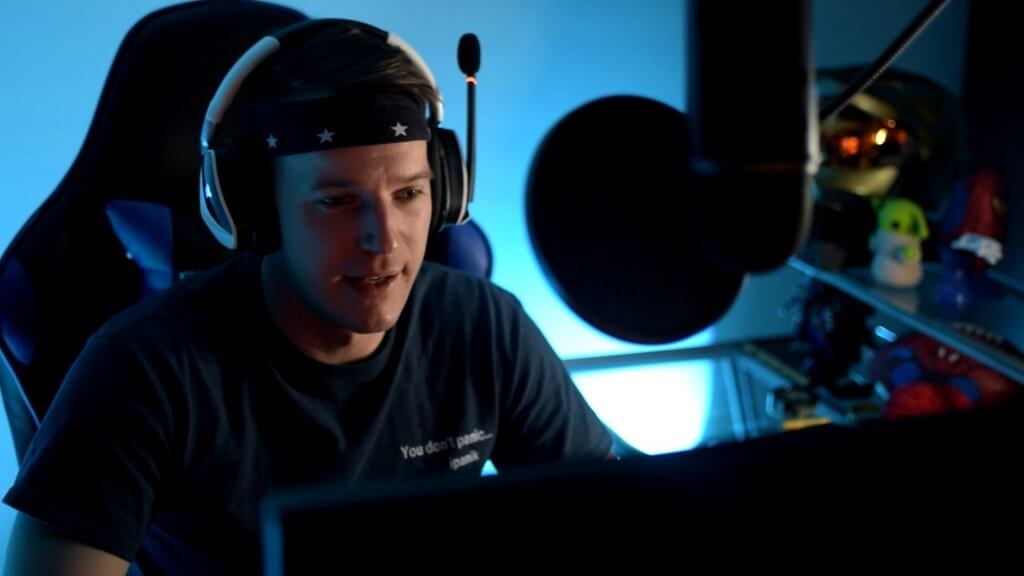When Washington Army National Guard soldier Sgt. Daniel Anderson experienced a traumatic event, he said his first response was to isolate himself. However, when he heard that his unit was launching an esports gaming team in summer 2019, he was one of the first to volunteer to become an official streamer for the unit.
“It very much became like a form of therapy for me,” Anderson said. “It forced me to be interactive, socialize more and bring myself to a place of normalcy. It revitalized my enjoyment of serving my country because I got to talk to so many new people every day.”
While playing video games as part of his military career is pretty great, Anderson noted the best part of representing the military in esports is the connections he makes with other military gamers. Also, the skills he’s been able to apply to his civilian career as a business owner.
Before joining the military esports program with the Washington ARNG, Anderson said he played video games as a hobby and embarked on a new venture to stream his gameplay on the unit’s Twitch channel in December 2019.
Now, he manages his own streaming business and collaborates with nonprofit and military-affiliated organizations for online gaming events. Known online by his gamer tag “thebiscuitwagon,” Anderson officially registered his business, The Biscuit Wagon, as an LLC in Washington state.
“I never would’ve thought of trying to stream on my own before this program,” he said. “After learning, I decided to launch my own business. I’m the owner of my own social media company.”
The Army launched its first esports team out of Fort Knox, Kentucky, in late-2018 as a recruitment and retention initiative. In July 2020, the U.S. House of Representatives passed the appropriations bill for fiscal year 2021 with an amendment prohibiting federal funds for “military recruitment via Twitch and esports activities.”
The bill is still with the Committee of Appropriations but points to how military decision makers might feel about military-gaming programs.
Army National Guard Maj. Ryan York realized leaders could underestimate the significance of a unit-run esports team. So, he has no problem helping them understand that gaming in the military is a step in the right direction.
“By the numbers, 60% of our formation plays games weekly,” he said. “If you want to understand your soldiers and how that relates to gaming, the vast majority participates casually, up to the top 500, in ‘League of Legends.’”
York is the program director for the Washington ARNG and took the job in addition to his primary duties as the recruiting and retention marketing public affairs officer. Since about 2020, York has elicited Washington ARNG soldiers to livestream themselves playing some of the most popular video games weekly.
He also coordinates tournaments where soldiers compete against other military players and esports teams for notoriety. They play games like “HALO” and “Call of Duty,” allowing military members to market their unit in a way they couldn’t when face-to-face interactions were prohibited. York attested that the Washington ARNG’s gaming tournaments generate about 10 recruitment leads whenever they host them. While matches might take place in a production studio, typically, soldiers participate and host weekly streams from home, using their gaming systems and camera setups.
“I don’t think this would’ve ever got to where it is without COVID-19,” he said. “I think it came at the right place, at the right time. The command bought into it because we could do this virtually while circumventing COVID-19 related issues to gain access to potential applicants and members.”
Outreach events with local high schools and colleges emphasize the skillsets video game streaming requires and how they can be applied to occupations in the information generation where content creation, video production and editing prove relevant in many careers.
Sgt. Robert Maldonado, of the D.C. Army National Guard’s 273rd Military Police Company, goes by the gamer tag “maldo_rob” as an Army National Guard official esports streamer. Maldonado and his wife own a marketing business outside of the military, which he said has reached a new level after learning how to stream while participating in the esports program.
“Being on this team, I’ve really learned a lot,” Maldonado said. “I’ve learned how to use a video camera properly and edit video using Adobe Premiere, which are tools I use to create content for my civilian business.”
Other than stream-production training, military gamers also receive public affairs training to ensure they’re interacting with their audience and presenting themselves in a professional matter. New team members shadow their more experienced teammates on streams before running their own. And, military streamers are required to be clean-shaven, restricted from consuming alcohol or using profanity during livestreams in order to represent the military honorably.
Members of the Washington ARNG even wear uniformed T-shirts during their streams for a more casual look.
Maldonado is among 10 other soldiers from states including Colorado, Illinois and Georgia who officially represent the Army National Guard in esports. He said live streaming is an optimal platform for humanizing military members while heightening unit morale.
“Before I even put on this uniform, I was already a gamer,” he said. “But this is something that my love for the military and passion for video games can merge and be something I can enjoy on both sides.”

